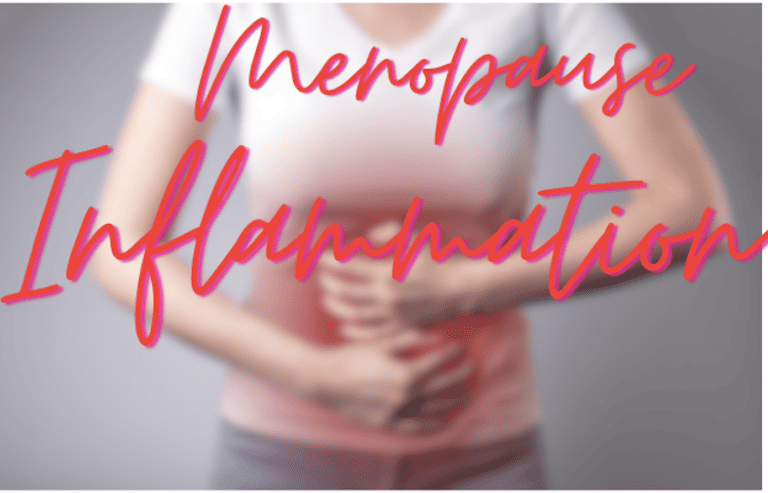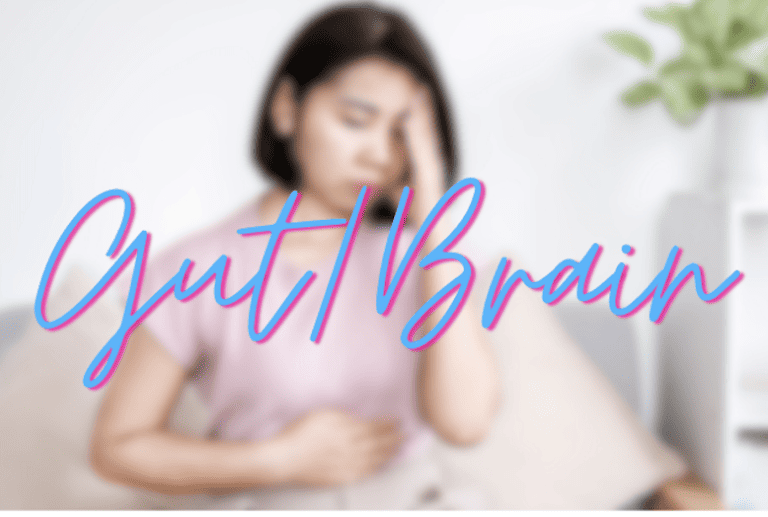9 Stress and Relaxation Techniques During Menopause How to Stay Relaxed

Menopause is stressful! The key is stress and relaxation techniques during menopause, easier said than done but once you get into a grove, the effort is completely worth it.
Stress and Relaxation Techniques During Menopause
First and foremost, the uncontrollable factor of menopause related symptoms, like stress, is caused by changing hormones. Women’s health is based on each aging year and when we get to that age which I believe to be the perimenopausal age, diminishing hormones lead to anxiety, stress, and even depression.
Secondly, putting aside the hormonal changes and the natural effects on our mental health, menopause is just stressful. I cannot kid a kidder, there is nothing relaxing about menopause symptoms like hot flashes, night sweats, low libido, sore joints, weight gain, thinning hair, and all the other physical sensations in an older woman’s life attributed to menopausal symptoms. You’re darn right we are stressed, and that doesn’t even include the other aspects of everyday life.
All of the above is non-medical terminology for menopause and stress but it is real and it all affects our mental health. Some of us are more successful at dealing with this than others. There are other contributors to stress management during menopause, embarrassment, many women lack of support at home or amongst other women, as well as our aging parents weren’t always the best role models when it came to symptoms of menopause.
We now can use all the knowledge available to improve our quality of life and focus on our well-being to tackle stress management and the symptoms of menopause head-on.
Common Stressors During Menopause
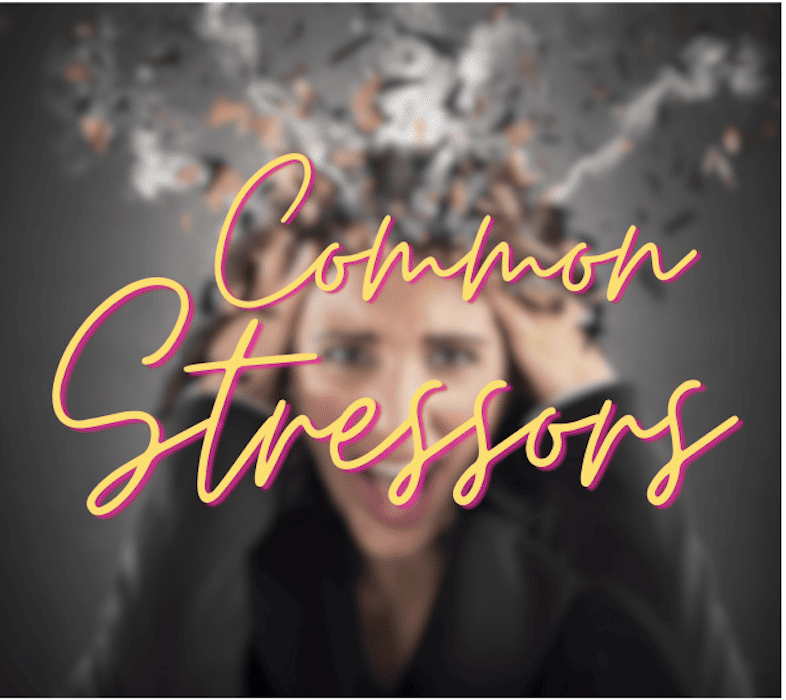
Hormones
Menopause symptoms like stress, anxiety, and mood swings have three common stressors. Again the uncontrollable stressor is fluctuating hormone levels. There are solutions to hormones like hormone therapy.
Lack of Exercise
There are two controllable stressors and one is lack of exercise. The biggest issue with exercise is that we all have a “go big or go home” attitude when it comes to exercise but even a daily life activity like walking for 15-30 minutes constitutes exercise and if done regularly(I walk daily first thing in the morning) will reduce stress during menopause. If walking is the baseline for exercise, then anything and I mean any other type of exercise or healthy activity will mitigate stress, weight gain, and other common symptoms of menopause.
Unhealthy Diet
The other is the lack of a healthy diet. This is another “go big or go home” scenario. These are the demons of diet; alcohol, sugar, and processed fatty foods like potato chips. Healthy people eat a healthy diet that includes realistic portions of all kinds of foods(unless they have allergies of course).
Reduced alcohol has been a game-changer for me. I am a social drinker and usually out with friends but once I started heading into menopause, alcohol disrupted everything, the way I felt, the way I perceived interactions, the way I slept. As we get older, it becomes more difficult for our bodies to process alcohol and since most of our preferred beverages include sugar it is a double whammy. Reduce or stop drinking alcohol when battling menopausal symptoms, I promise you will feel more relaxed.
I am a sucker for a good piece of candy and I don’t discriminate when it comes to candy or any other dessert item. Once I reduced my sugar intake, the inflammation went down and my stress levels reduced. It is not easy and I have decided on the moderation route for sugar reduction and replaced it with items like honey, more fruit, and spices like cinnamon.
I have never been a “salty” person but I will steal a chip or french fry from my husband’s plate. It’s an evil circle, the bad fat, and amount of salt, all lead to bloating which just adds to the stress of menopause-related symptoms. I have cut these processed foods out of my healthy diet.
It is amazing how a few adjustments to diet and again, it doesn’t need to be an overhaul, just the three adjustments above positively impact my stress and anxiety levels.
The Impact of Common Stress
The impact of common stress is as follows and it isn’t a pretty picture; heart disease, digestive issues, high blood pressure, weight gain, memory loss, and inflammation. So let’s get to the good stuff and discover ways to reduce stress and relax a bit during menopause and really for the rest of our lives.
Stress Management Strategies
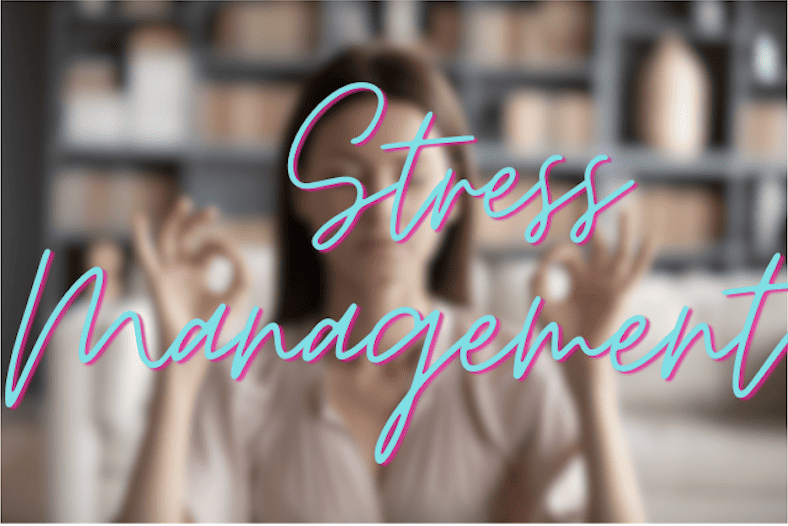
Deep Breathing, Stretch and Meditate
I am not suggesting all three at once but one or even a combination of these three activities to manage stress levels. One of the oldest that combines all three is progressive muscle relaxation techniques, it is a pretty simple exercise involving contracting and relaxing every muscle in your body by starting with your toes, moving to calves working your way through each muscle group to your neck then face.
Eat Healthy
We have all made eating healthy so complicated and it doesn’t need to be. Everyone has a different definition of healthy people and healthy eating. I turn to the app Macrostax for a balanced day. Macrostax tells me(based on age, weight, and height) how many calories I should consume daily(it’s more than you think) as well as the combination of macros in my daily consumption(fats, protein, and carbs). I hit my goals and ramped up my metabolism.
I reduce stress by eliminating or reducing alcohol, sugar, and salty processed foods in addition to ramping up protein intake for a stronger metabolism, stronger muscles, and less fat.
Exercise Regularly
I exercise every day. Some days are more intense than others and at least three times a week, I include weight training, again for a stronger metabolism for weight loss. I try not to beat myself on the level of intensity. If I am feeling anxious or stressed, I drop it all and walk for 5 minutes(sometimes screaming profanities in my mind), after 5 minutes, tensions are down dramatically.
Sleep
This isn’t something new but it is tried and true. Sleep. I shoot for 7 hours but work for 7.5 hours. I wake up at 5:30 am to workout, walk, and exercise in order to get the day started in a timely fashion so going to bed earlier than most is a must and am sure to be in my best pajamas for menopause. Sleep solves everything, your mind rests, your body recovers and it is the reset for a new day.
Avoid Tabacco
Anything related to tobacco is toxic and deadly in addition to the nicotine which inherently makes you stressed and anxious. Adding menopause symptoms on top of tobacco use is a recipe for disaster. If no one has convinced you to quit tobacco yet, just stop. Menopausal symptoms cannot be controlled with tobacco, you are torturing yourself. There are many resources for quitting tobacco and I believe you are worth it.
Meditation
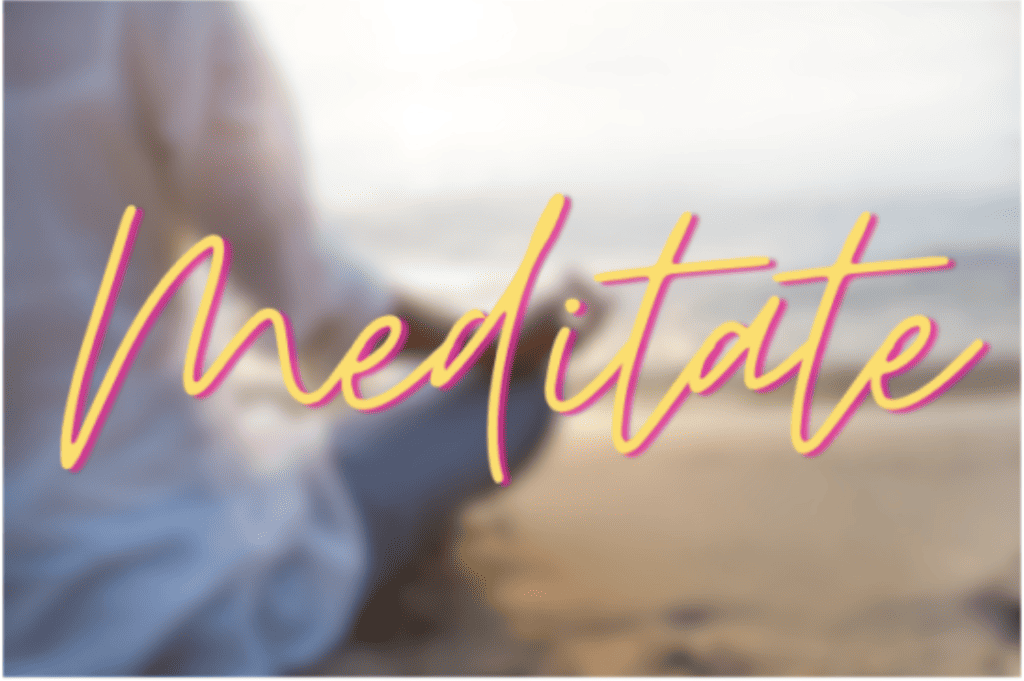
Psychological symptoms of menopause include brain fog, mood swings, anxiety, stress, and depression. My meditation skills are beginner at best but there is a difference in my attitude when I meditate. Here are the basics:
Find a place that is calm and quiet for you
Set a time limit, I only meditate for one to two minutes. I can succeed in that time frame.
Start from your toes and notice your body all the way to the top of your head
Put your hand on your chest and feel your breath
Don’t let your mind wander
Close with an affirmation and kindness. I use this opportunity to say something nice to myself.
Deep breathing and stress reduction are definitely connected and for immediate relief from an anxiety attack or mood swings, I take a few moments, empty my head, inhale deeply for 3-5 seconds, and slowly exhale. I use deep breathing to reset.
The mindfulness-based stress reduction will relieve muscle tension. In other words, being mindful of why you are stressed(hormone fluctuations) is the first step to peace. Other health risks like high blood pressure also get the benefits of your mindfulness especially when meditating.
Yoga
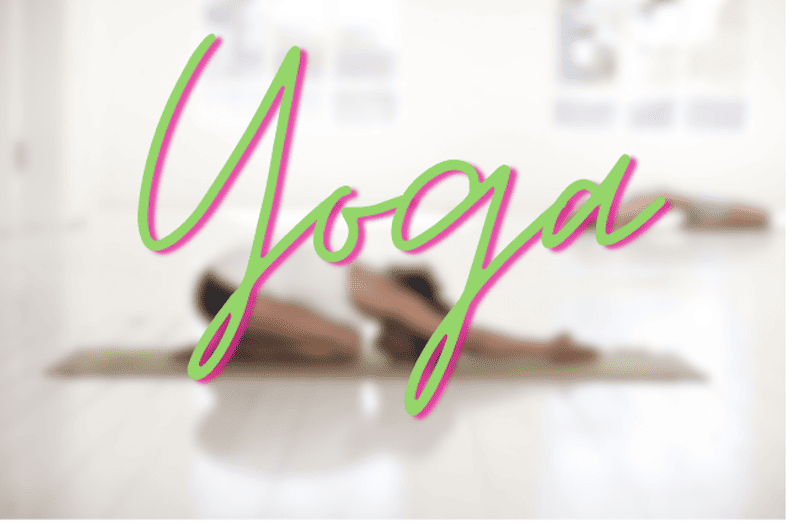
Yoga is the best, it combines mental and physical balance with relaxation exercises, strength exercises, and deep breathing. Yoga also uses progressive muscle relaxation techniques usually to finish and without a doubt is a direct path to reduce stress.
My favorite app for yoga is Asana Rebel. They start at the very beginning with all opportunities to advance and succeed in doing yoga. You can also participate in goal setting and interactive community, and their instruction is top-notch, I always feel like I am succeeding with this app. My favorite is if I don’t have too much time, some flows are 10-15 minutes.
Breathing Exercise
Reduce stress with deep breaths with the 4-7-8 breathing exercises. Breath in for 4 seconds, hold your breath for 7 seconds, and exhale for 8 seconds. An easy fix for reducing anxiety and stress.
Herbal Remedies and Supplements

Not all diets are created equal and the easiest way to fill the voids of what is missing in your diet are dietary supplements for menopause. There are a wide variety of menopause supplements that tackle stress management, hot flashes, night sweats, bloating, brain fog, and many other menopausal symptoms.
Conclusion
Mindfully we can naturally control menopausal symptoms and reduce stress with healthy eating, exercise, meditation, and deep breathing. Progressive muscle relaxation techniques are a big hit for not only relaxing but also for the achy joints and muscles that come with menopause.
The easiest and least expensive solution for stress and anxiety is deep breathing whenever needed. The mindful intentions of deep breathing are worth the effort of dropping everything to focus on yourself. Remember, be patient and be kind to yourself.



